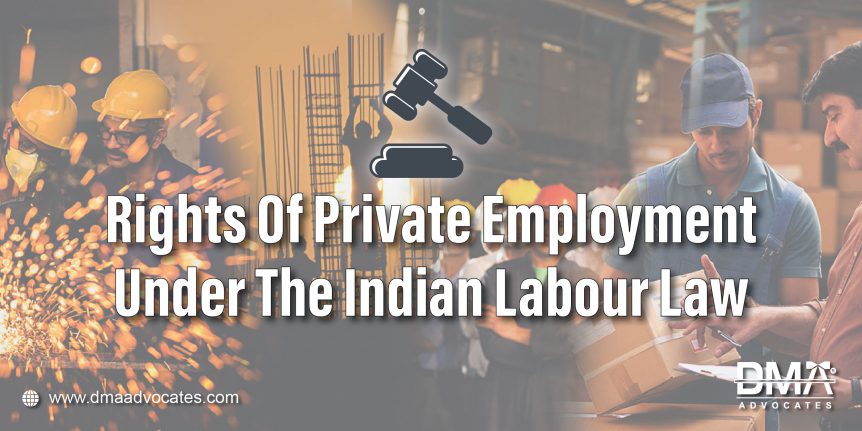Although there are employment conditions that define specific conditions, organized employees of the private sector are governed by various laws, such as the Premium Payment Law, the Equal Payment Law, the Bond Payment Law, the Pension Fund of Employees and the Law of various provisions, the status of employees. Insurance Law, Maternity Benefits Law, etc.
The right to a safe workplace with basic equipment, the right to adequate work hours, the right to insurable benefits, etc. They are protected by law. Here is a list of the essential rights of an employee under various Legal laws and regulations:
EMPLOYMENT AGREEMENT
Currently, the norm is to enter into an employment contract that specifies working conditions, such as salary, place of work, designation, hours of work, etc. The rights and obligations of employers and employees are clearly indicated as the non-disclosure of confidential information and trade secrets, timely payments, contingency funds, etc. In case of dispute, the contract also contains an effective dispute resolution mechanism.
But the fact is that without a written employment contract, the employee does not have many protections granted in case of conflict.
MATERNITY BENEFIT
The Maternity Benefits Act 1961 establishes prenatal and postnatal benefits for an employee in an establishment. Changes after 2017, the length of paid leave of a pregnant employee increased to 26 weeks, including eight weeks of paid postnatal leave.
In case of complicated pregnancy, delivery, premature birth, medical interruption, employees are entitled to one month of paid leave. In the case of a tubectomy, only two additional weeks of paid leave are planned.
Pregnant employees can not be dismissed due to this absence. These employees should not be employed by the employer within six weeks of giving birth or miscarriage. In the event of dismissal, they can still claim maternity benefits.
In India, men do not get paid paternity leave. The central government provides childcare leave and paid parental leave. But in the case of the private sector, it is a discretionary right of the employer.
PROVIDENT FUND
The Employment Pension Fund Organization (EPFO) is the national organization that administers this pension scheme for all employees. Any organization with more than 20 employees has a legal obligation to register with the EPFO.
Any employee may choose not to participate in the plan as long as he does so early in his career. The value can not be deleted at will. The rules limit the amount of withdrawal and the length of years of service. Once registered, the employer and the employee must pay 12% of the base salary to the fund. If the employer does not pay his / her share or retain 12% of the employee’s total salary, the employee may be referred to the Court of Appeal for compensation.
GRATUITY
The Bond Payment Act of 1972 grants an employee who has been in service for more than five years the right to a bonus. This is one of the retirement benefits granted to the employee. This is a fixed payment made in thanks to the employee for his service. The value of the bonus increases with the increase and the number of years of service.
However, if the employee is fired for illegal conduct or is untidily demonstrated, he loses this right in case of termination of employment.
TIMELY AND FAIR SALARY
The value of providing services to an employee is fair and adequate compensation. Article 39 (d) of the Constitution establishes equal pay for the same work. The laws under the Equal Payment Act, the Payroll Law, prescribe a quick and equitable compensation for an employee. If an employee does not receive their compensation under the employment contract, he or she can ask the employment commissioner or file a civil compensation action. An employee cannot receive a salary below the legal minimum wage in accordance with the law. A more detailed review of compensation under the Equal Remuneration Act is available in this article.
APPROPRIATE WORKING HOURS AND OVERTIME
All employees have the right to work in a safe workplace with basic equipment and hygiene.
The Law on Factories establishes and the Law on Stores and Establishments (at the state level) protects the rights of workers and non-workers.
Under the latest laws, an adult worker must work more than 9 hours a day or 48 hours a week and overtime is double the normal salary. A worker can work from 6 to 19 hours. This can be relaxed until 9:30 pm with explicit authorization and payment of overtime and safe means of transportation. In addition to these weekly vacations, a half-hour break and no more than 12 hours of work per day are required. The working hours of working children are limited to 4.5 hours per day.
RIGHT TO LEAVES
An employee is entitled to vacation and paid leave, such as casual leave, sick leave, privilege leave and other leave. For every 240 business days, an employee is entitled to 12 days of annual leave. An adult worker can take advantage of a leave obtained every 20 days, while it is 15 days for a young worker. During the notification period, an employee may take an emergency leave provided that the employment contract does not prevent it.If your are looking for any kind of legal support please contact our Expert lawyers.


